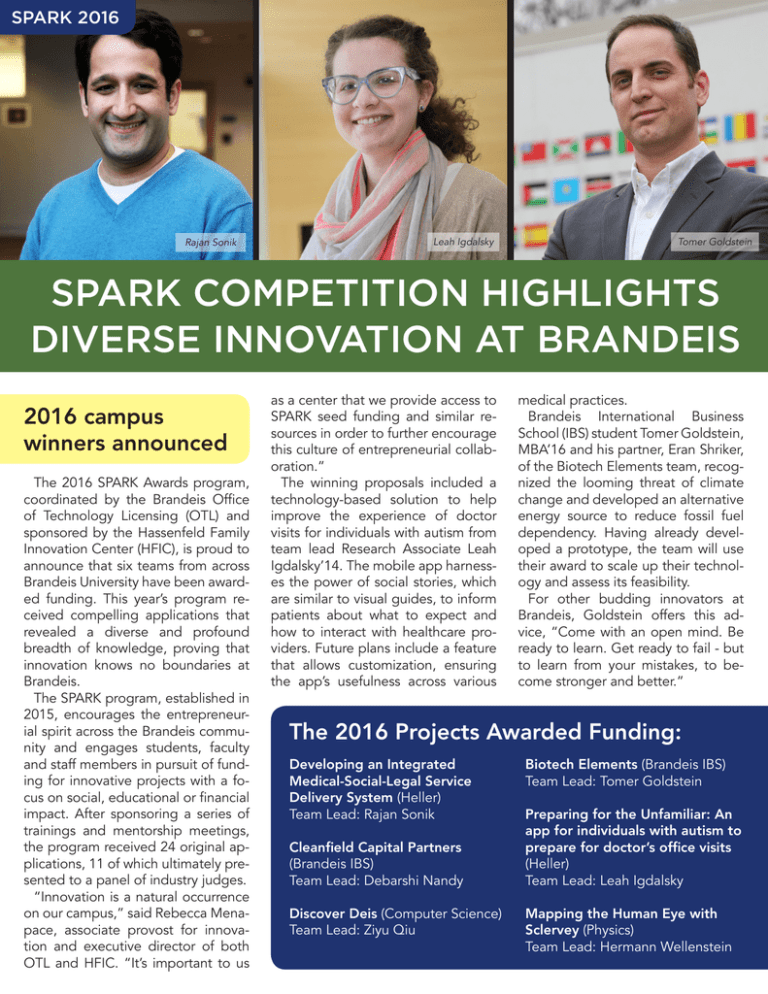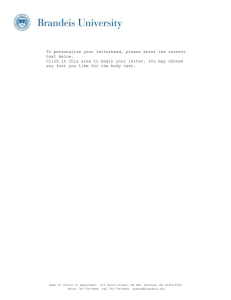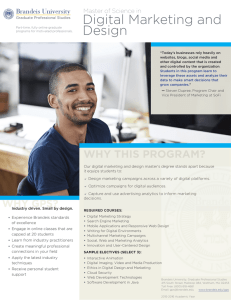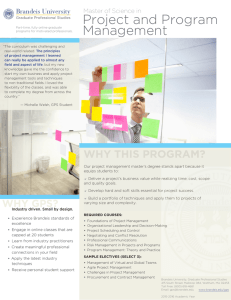SPARK COMPETITION HIGHLIGHTS DIVERSE INNOVATION AT BRANDEIS 2016 campus SPARK 2016
advertisement

SPARK 2016 Rajan Sonik Leah Igdalsky Tomer Goldstein SPARK COMPETITION HIGHLIGHTS DIVERSE INNOVATION AT BRANDEIS 2016 campus winners announced The 2016 SPARK Awards program, coordinated by the Brandeis Office of Technology Licensing (OTL) and sponsored by the Hassenfeld Family Innovation Center (HFIC), is proud to announce that six teams from across Brandeis University have been awarded funding. This year’s program received compelling applications that revealed a diverse and profound breadth of knowledge, proving that innovation knows no boundaries at Brandeis. The SPARK program, established in 2015, encourages the entrepreneurial spirit across the Brandeis community and engages students, faculty and staff members in pursuit of funding for innovative projects with a focus on social, educational or financial impact. After sponsoring a series of trainings and mentorship meetings, the program received 24 original applications, 11 of which ultimately presented to a panel of industry judges. “Innovation is a natural occurrence on our campus,” said Rebecca Menapace, associate provost for innovation and executive director of both OTL and HFIC. “It’s important to us as a center that we provide access to SPARK seed funding and similar resources in order to further encourage this culture of entrepreneurial collaboration.” The winning proposals included a technology-based solution to help improve the experience of doctor visits for individuals with autism from team lead Research Associate Leah Igdalsky’14. The mobile app harnesses the power of social stories, which are similar to visual guides, to inform patients about what to expect and how to interact with healthcare providers. Future plans include a feature that allows customization, ensuring the app’s usefulness across various medical practices. Brandeis International Business School (IBS) student Tomer Goldstein, MBA’16 and his partner, Eran Shriker, of the Biotech Elements team, recognized the looming threat of climate change and developed an alternative energy source to reduce fossil fuel dependency. Having already developed a prototype, the team will use their award to scale up their technology and assess its feasibility. For other budding innovators at Brandeis, Goldstein offers this advice, “Come with an open mind. Be ready to learn. Get ready to fail - but to learn from your mistakes, to become stronger and better.” The 2016 Projects Awarded Funding: Developing an Integrated Medical-Social-Legal Service Delivery System (Heller) Team Lead: Rajan Sonik Cleanfield Capital Partners (Brandeis IBS) Team Lead: Debarshi Nandy Discover Deis (Computer Science) Team Lead: Ziyu Qiu Biotech Elements (Brandeis IBS) Team Lead: Tomer Goldstein Preparing for the Unfamiliar: An app for individuals with autism to prepare for doctor’s office visits (Heller) Team Lead: Leah Igdalsky Mapping the Human Eye with Sclervey (Physics) Team Lead: Hermann Wellenstein #DEISINNOVATOR more direct and meaningful dialogue with both my mentors and my peers. What advice do you have for other budding innovators at Brandeis? DAVID MATTHEWS TALKS INNOVATION @ BRANDEIS David Matthews ’16 is a physicist, a musician, a mathematician and an innovator. He is one of Professor Wellenstein’s team, which received SPARK funding this year for the project, Mapping the Human Eye with Sclervey. It will enable the creation of a prototype device that can map deformed corneas to create custom lenses and restore sight. We sat down with Matthews to get his perspective on the SPARK program and on the innovation scene at Brandeis. What makes innovation and entrepreneurship at Brandeis so important? I think that it’s particularly helpful for both the university and its students to have an environment of encouragement. Our students come from a variety of backgrounds, so you’re going to get an equal variety of perspectives on how to approach projects. I work in a physics lab, but before I came to Brandeis I was actually a music major. Being able to work in these groups and apply for opportunities like the SPARK grant allow you to take your creative idea – be it the beginning of a big project or a thought to further an idea along – and translate it into something for the real world. How has the SPARK experience complemented your overall education at Brandeis University? The SPARK experience has given me a real understanding of how ideas can turn into tangible solutions. In particular, it has given me some insight into the people skills required in the innovation community. This has translated into much It’s very important to be humble about whatever you are doing and recognize that there are lots of things this world needs. Whatever you’re working on might be amazing, but it’s important to remember that there are so many other people who also have that fire in their hearts. If you don’t get a certain grant or opportunity, that doesn’t mean that your idea isn’t great, and it certainly doesn’t mean that you should give up. It just means that for that particular situation, something else was more applicable. Don’t take rejection too seriously. Why should other community members take part in Brandeis’ innovation community? I think it’s wonderful that these opportunities exist at research universities. In addition to actually allowing you to make an impact with your idea, it also serves as a stepping stone toward your future aspirations. Other schools just can’t really match up. They might have prestigious names like Brandeis, but there’s something next-level about the experience of actually bringing your ideas to materialization. The Brandeis innovation experience is something you can take to graduate school, to a job interview or even to a startup. That’s such a unique opportunity that not every school can provide the way Brandeis does. It’s something you can talk about for the rest of your life. It’s much more than a college project – it’s your ideas in the real world. To learn more about SPARK, past recipients and additional resources, visit brandeis.edu/otl/grants.



